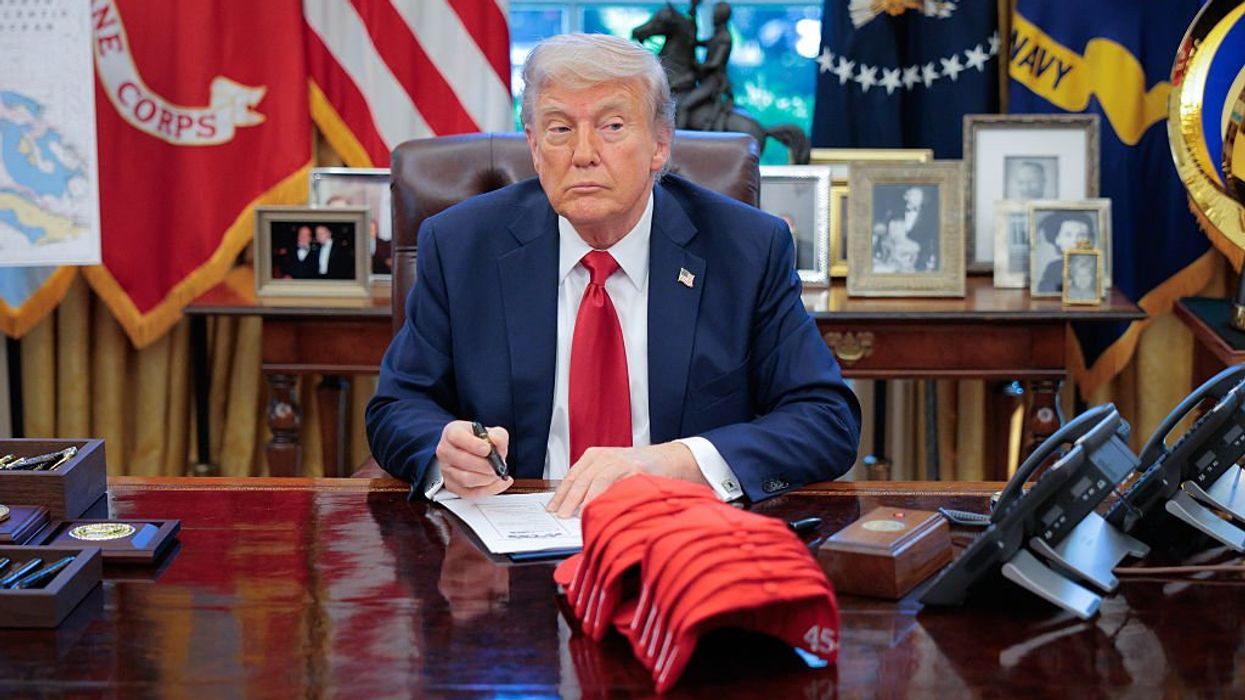On July 25, 1933, President Franklin D. Roosevelt gave a radio address to 125 million Americans in which he coined the term “first 100 days.” Today, the 100th day of a presidency is considered a benchmark to measure the early success or failure of a president.
Mr. Trump’s 100th day of office lands on April 30, when the world has witnessed his 137 executive orders, 39 proclamations, 36 memoranda, a few Cabinet meetings, and numerous press briefings. In summary, Trump’s cabinet appointments and seemingly arbitrary, capricious, ad hoc, and erratic actions have created turmoil in the stock market, utter confusion among our international trade partners, and confounded unrest with consumers, workers, small business owners, and corporate CEOs.
Interestingly, a recently published UMass/YouGov poll found that 26 percent of the people who voted for Trump have lost their confidence and appeal for our 47th president.
It appears The New York Times was the first media agency to report, on just the 18th day of Trump’s 2.0 presidency, that Trump was creating a constitutional crisis. That claim has been reported in multiple major news agencies, spoken in town hall meetings, and observed in thousands of public protests with demonstrators from all political persuasions requesting Congress and the Supreme Court to stop our democracy from turning into an authoritarian dictatorship.
On March 25, I sent an e-mail to authoritarian scholar Barbara McQuade (who is a professor at the University Michigan Law School, previous U.S. Attorney for the Eastern District of Michigan, and author of “Attack from within”) seeking her expert opinion on what citizens would most likely witness when a constitutional crisis has occurred and on recommended action citizens should take.
Two days later, McQuade replied to my inquiry: “If a president were to deliberately violate a court order, I think we could consider that a constitutional crisis,” and she added, “Citizens can do many things to push back against abuse of power, such as vote, write to their member of Congress, or participate in a protest, but I think the most effective thing a citizen can do is to talk to their friends and neighbors to explain their concerns and rally support.”
Republican Peter Wehner, who served as the speechwriter for three GOP administrations (i.e., Ronald Reagan, George H.W. Bush, and George W. Bush) and senior fellow at Trinity Forum — an American faith-based non-profit Christian organization — feels Trump has created not one, not two, but three crisis situations. Wehner stated in an April 19 Wall Street Journal article, “It seems as if we are moving at a rapid speed toward a genuine constitutional crisis, a genuine separation-of-powers crisis, and a genuine checks-and-balances crisis.”
You can decide if any of the following actions and published repercussions put America in the precarious dilemma of being in a constitutional crisis:
- Trump has openly defied federal court directives, refusing to halt deportation flights to El Salvador and return an illegally deported Maryland man.
- Trump has eliminated and/or dismantled federal agencies — like USAID — by executive order, bypassing Congressional authority.
- Trump has claimed the right to withhold or redirect federal funds appropriated by law, undermining Congress’s constitutional power of the purse.
- Trump has fired civil service-protected employees, a violation of federal law.
- Trump is attempting to end birthright citizenship by executive action, a constitutional right under the 14th Amendment.
- Trump has withheld funds from universities without legal justification.
- Trump has revoked visas solely because of the holders’ expressed viewpoints, violating First Amendment protections.
- Trump has attacked federal judges, questioning their legitimacy and authority, which erodes the independence of the judiciary.
- Trump has created DOGE without Congressional approval, challenging the separation of powers.
- Trump has set tariffs on our trading partners as opposed to Article 1, Section 8 of the U.S. Constitution that grants Congress the explicit power to “lay and collect Taxes, Duties, Imposts and Excises” and to “regulate Commerce with foreign Nations.”
Polling by the revered and non-political Reuters/Ipsos found 83 percent of Americans feel “Trump must obey federal court rulings even if he doesn’t want to” (April 20). Wall Street Journal polling has shown that “voters want to keep constitutional guardrails in place that constrain a president’s power” (April 4).
Keep in mind, as of April 23, there have been 208 legal challenges to the Trump administration’s actions (Just Security – New York Univ. School of Law). Additionally, a probable Trump-related contempt of court opinion was issued by U.S. District Court Chief Judge James Boasberg, which, if ordered, could lead to incarceration (Law News, April 23).
If you are concerned about Mr. Trump’s endeavors, consider the advice offered by law professor McQuade: participate in peaceful rallies, support political candidates committed to upholding constitutional democracy, communicate with your two Senators and Representatives about your concerns, and visit with friends about the trifecta crisis that is becoming more evident by political scientists, authoritarian scholars, constitutional law experts, and registered voters like you and me.
Steve Corbin is a Professor Emeritus of Marketing, University of Northern Iowa.




















Eric Trump, the newly appointed ALT5 board director of World Liberty Financial, walks outside of the NASDAQ in Times Square as they mark the $1.5- billion partnership between World Liberty Financial and ALT5 Sigma with the ringing of the NASDAQ opening bell, on Aug. 13, 2025, in New York City.
Why does the Trump family always get a pass?
Deputy Attorney General Todd Blanche joined ABC’s “This Week” on Sunday to defend or explain a lot of controversies for the Trump administration: the Epstein files release, the events in Minneapolis, etc. He was also asked about possible conflicts of interest between President Trump’s family business and his job. Specifically, Blanche was asked about a very sketchy deal Trump’s son Eric signed with the UAE’s national security adviser, Sheikh Tahnoon.
Shortly before Trump was inaugurated in early 2025, Tahnoon invested $500 million in the Trump-owned World Liberty, a then newly launched cryptocurrency outfit. A few months later, UAE was granted permission to purchase sensitive American AI chips. According to the Wall Street Journal, which broke the story, “the deal marks something unprecedented in American politics: a foreign government official taking a major ownership stake in an incoming U.S. president’s company.”
“How do you respond to those who say this is a serious conflict of interest?” ABC host George Stephanopoulos asked.
“I love it when these papers talk about something being unprecedented or never happening before,” Blanche replied, “as if the Biden family and the Biden administration didn’t do exactly the same thing, and they were just in office.”
Blanche went on to boast about how the president is utterly transparent regarding his questionable business practices: “I don’t have a comment on it beyond Trump has been completely transparent when his family travels for business reasons. They don’t do so in secret. We don’t learn about it when we find a laptop a few years later. We learn about it when it’s happening.”
Sadly, Stephanopoulos didn’t offer the obvious response, which may have gone something like this: “OK, but the president and countless leading Republicans insisted that President Biden was the head of what they dubbed ‘the Biden Crime family’ and insisted his business dealings were corrupt, and indeed that his corruption merited impeachment. So how is being ‘transparent’ about similar corruption a defense?”
Now, I should be clear that I do think the Biden family’s business dealings were corrupt, whether or not laws were broken. Others disagree. I also think Trump’s business dealings appear to be worse in many ways than even what Biden was alleged to have done. But none of that is relevant. The standard set by Trump and Republicans is the relevant political standard, and by the deputy attorney general’s own account, the Trump administration is doing “exactly the same thing,” just more openly.
Since when is being more transparent about wrongdoing a defense? Try telling a cop or judge, “Yes, I robbed that bank. I’ve been completely transparent about that. So, what’s the big deal?”
This is just a small example of the broader dysfunction in the way we talk about politics.
Americans have a special hatred for hypocrisy. I think it goes back to the founding era. As Alexis de Tocqueville observed in “Democracy In America,” the old world had a different way of dealing with the moral shortcomings of leaders. Rank had its privileges. Nobles, never mind kings, were entitled to behave in ways that were forbidden to the little people.
In America, titles of nobility were banned in the Constitution and in our democratic culture. In a society built on notions of equality (the obvious exceptions of Black people, women, Native Americans notwithstanding) no one has access to special carve-outs or exemptions as to what is right and wrong. Claiming them, particularly in secret, feels like a betrayal against the whole idea of equality.
The problem in the modern era is that elites — of all ideological stripes — have violated that bargain. The result isn’t that we’ve abandoned any notion of right and wrong. Instead, by elevating hypocrisy to the greatest of sins, we end up weaponizing the principles, using them as a cudgel against the other side but not against our own.
Pick an issue: violent rhetoric by politicians, sexual misconduct, corruption and so on. With every revelation, almost immediately the debate becomes a riot of whataboutism. Team A says that Team B has no right to criticize because they did the same thing. Team B points out that Team A has switched positions. Everyone has a point. And everyone is missing the point.
Sure, hypocrisy is a moral failing, and partisan inconsistency is an intellectual one. But neither changes the objective facts. This is something you’re supposed to learn as a child: It doesn’t matter what everyone else is doing or saying, wrong is wrong. It’s also something lawyers like Mr. Blanche are supposed to know. Telling a judge that the hypocrisy of the prosecutor — or your client’s transparency — means your client did nothing wrong would earn you nothing but a laugh.
Jonah Goldberg is editor-in-chief of The Dispatch and the host of The Remnant podcast. His Twitter handle is @JonahDispatch.